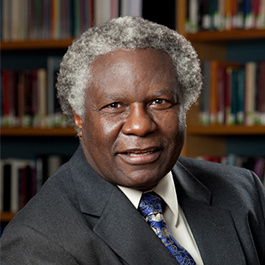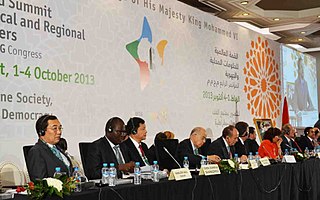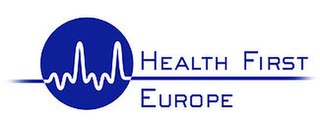
The United Nations Economic and Social Council (ECOSOC) is one of six principal organs of the United Nations, responsible for coordinating the economic and social fields of the organization, specifically in regards to the fifteen specialized agencies, the eight functional commissions, and the five regional commissions under its jurisdiction.

The United Nations Environment Programme (UNEP) is responsible for coordinating responses to environmental issues within the United Nations system. It was established by Maurice Strong, its first director, after the United Nations Conference on the Human Environment in Stockholm in June 1972. Its mandate is to provide leadership, deliver science and develop solutions on a wide range of issues, including climate change, the management of marine and terrestrial ecosystems, and green economic development. The organization also develops international environmental agreements; publishes and promotes environmental science and helps national governments achieve environmental targets.

The United Nations Economic Commission for Europe is one of the five regional commissions under the jurisdiction of the United Nations Economic and Social Council. It was established in order to promote economic cooperation and integration among its member states.

The International Association of Universities (IAU) is a membership-led non-governmental organization working in the field of global higher education. It has more than 600 members in over 130 countries, including institutions, organizations, affiliates, and associates in higher education. The IAU was created under and is an official associate partner of the United Nations Educational Scientific and Cultural Organization (UNESCO).

The World Health Assembly (WHA) is the forum through which the World Health Organization (WHO) is governed by its 194 member states. It is the world's highest health policy setting body and is composed of health ministers from member states.
The International Pharmaceutical Federation or Fédération Internationale Pharmaceutique, abbreviated as FIP, is a non-governmental organization (NGO) with official relations with the World Health Organization. It is the global body representing over four million pharmacists, pharmaceutical scientists and pharmaceutical educators through 158 national organisations, academic institutional members and individual members.
The International Federation of Library Associations and Institutions (IFLA) is an international body representing the interests of people who rely on libraries and information professionals. A non-governmental, not-for-profit organization, IFLA was founded in Scotland in 1927 with headquarters at the National Library of the Netherlands in The Hague. IFLA sponsors the annual IFLA World Library and Information Congress, promoting access to information, ideas, and works of imagination for social, educational, cultural, democratic, and economic empowerment. IFLA also produces several publications, including IFLA Journal.

Calestous Juma was a Kenyan scientist and academic, specializing in sustainable development. He was named one of the most influential 100 Africans in 2012, 2013 and 2014 by the New African magazine. He was Professor of the Practice of International Development and Faculty Chair of the Innovation for Economic Development Executive Program at Harvard Kennedy School. Juma was Director of the School's Science, Technology and Globalization Project at Harvard Kennedy School as well as the Agricultural Innovation in Africa Project funded by the Bill and Melinda Gates Foundation.
The United Nations Human Settlements Programme (UN-Habitat) is the United Nations programme for human settlements and sustainable urban development. It was established in 1977 as an outcome of the first United Nations Conference on Human Settlements and Sustainable Urban Development held in Vancouver, Canada, in 1976. UN-Habitat maintains its headquarters at the United Nations Office at Nairobi, Kenya. It is mandated by the United Nations General Assembly to promote socially and environmentally sustainable towns and cities with the goal of providing adequate shelter for all. It is a member of the United Nations Development Group. The mandate of UN-Habitat derives from the Habitat Agenda, adopted by the United Nations Conference on Human Settlements in Istanbul, Turkey, in 1996. The twin goals of the Habitat Agenda are adequate shelter for all and the development of sustainable human settlements in an urbanizing world.
The Union for International Cancer Control or UICC is a non-governmental organisation with over 1,150 member organisations in more than 170 countries and territories.
The International Federation of Pharmaceutical Manufacturers & Associations (IFPMA) is a trade association that represents internationally over 90 pharmaceutical companies and associations around the world. IFPMA is based in Geneva and is in official relations with the United Nations where it contributes industry expertise to global health discussions.
The Commonwealth Foundation (CF) is an intergovernmental organisation that was established by the Commonwealth Heads of Government in 1966, a year after its sister organisation, the Commonwealth Secretariat. The foundation is located at Marlborough House in London, a former royal palace which was assigned for the use of these Commonwealth institutions by Her Majesty Queen Elizabeth II, the former Head of the Commonwealth. As the Commonwealth agency for civil society, the foundation is funded by 49 member states to support participatory governance through its programmes. The foundation provides resources, grants and access to platforms to encourage better engagement between civil society and institutions of governance. Membership of the Commonwealth Foundation is voluntary and is separate from membership of the Commonwealth of Nations.

The International Handball Federation (IHF) is the administrative and controlling body for handball and beach handball. IHF is responsible for the organisation of handball's major international tournaments, notably the IHF World Men's Handball Championship, which commenced in 1938, and the IHF World Women's Handball Championship, which commenced in 1957.

United Cities and Local Governments (UCLG) is an umbrella international organisation for cities, local and regional governments, and municipal associations.

Health First Europe (HFE) is a non-profit, non-commercial alliance of patients, healthcare workers, academics and healthcare experts, and the medical technology industry. It aims to ensure equitable access to modern, innovative, and reliable medical technology for all European citizens. The organization works together with all health stakeholders at the European level. HFE is based in Brussels and has 20 member organizations and 10 individual members.
The Swiss Red Cross, or SRC, is the national Red Cross society for Switzerland.

The International Pharmaceutical Students' Federation (IPSF) is a non-governmental, non-political and non-religious organisation that represents pharmaceutical students, pharmacy students and recent graduates from all over the world. It was founded in 1949 and it is the oldest faculty-based student organisation. IPSF represents over 500,000 individuals in more than 100 countries with 127 different representative pharmacy student member organisations.

The World Federation of Engineering Organizations is an international, non-governmental organization representing the engineering profession worldwide.
Action Health Incorporated (AHI), established in 1989 and based in Lagos, Nigeria, is a non-profit organization dedicated to promoting the health and development of young people, particularly adolescent girls, "to ensure their successful transition to healthy and productive adulthood". Integral to AHI's programming is the involvement of the young people themselves, who play a prominent role in organizing activities and representing AHI at local, national, and international conferences.








